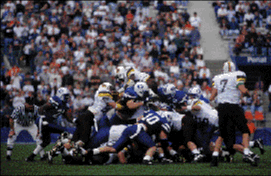“Don’t Do Dumb Things”
Lee Ann Layton Setzer, ’89, and Stephen M. Setzer, ’90, Springville, Utah
Elder Jacob de Jager of the First Quorum of the Seventy gave a fireside talk on Feb. 5, 1989, called “Perfecting the Saints.” I’m afraid the two of us have forgotten most of what he said, but the following homely advice stuck with us through our courtship that year and through the next 12 years of marriage:
When I mentioned controlled behavior through self-discipline, I thought of the scripture in the Book of Mormon where the prophet Jacob says to the multitude, “O be wise; what can I say more?” (Jacob 6:12). Now, isn’t that a wonderful teaching? Maybe we should write these two words on a piece of paper, just simply, black on white for our perfection, “Be Wise.” You know how I translate that, or paraphrase it? He said, “Oh, don’t do dumb things. What can I say more?” [Brigham Young University 1988–89 Devotional and Fireside Speeches (Provo: Brigham Young University, 1989), p. 88]
At times when more complex or eloquent teachings do not come easily to mind, we find we can always remember, “Oh, don’t do dumb things”!
Weekly Wonderment
Ann Lundberg Kronmiller, ’66, Springville, Utah
Coming to BYU in 1962 from a very small high school in Montana, I was struck by the opportunities opened to students through the devotionals (every Tuesday morning at 10 in the Smith Fieldhouse) and the forums (every Thursday morning). The only time I had seen a General Authority in my youth was when my family visited Salt Lake City and saw President David O. McKay in a Days of ’47 parade. Seeing General Authorities weekly in devotionals astounded me. I was also awestruck by many of the forum speakers. I remember listening to such speakers as Dr. Norman Vincent Peale (“Why Positive Thinkers Get Positive Results”), Howard K. Smith (“The Changing Challenge to America”), Allen Drury (“A Challenge to America—The View from Washington”), and Winston Churchill (“The Changing Face of European Politics”). Most memorable of all was hearing Maria Von Trapp in 1965 (“The Real Story of Maria Von Trapp”). Speaking of her days at an abbey in Salzburg and then raising Captain Von Trapp’s children, she poignantly taught that “the most important thing in life is to find out what is the will of God and then go and do it.” I remember being stunned when she said, “To make a long story short, I fell in love with the children and married the father; I got used to the father, and we were very happy.” I had never thought that people could be happily married without being madly in love. I’ve ever since been doubly grateful that “madly in love” as well as “very happy” happened for me!
Off the Worry List
Laura Jackson Davis, ’87, Paulsbo, Wash.
It’s been 15 years since I graduated from BYU and even longer since I sat in the Marriott Center and heard the speaker tell me I must remove myself from the “worry list” of the Brethren. His speech also suggested that my reason to do well in life should be to make myself more able to serve others. The Spirit carried his plea to my heart and I resolved to make emotional, physical, and spiritual decisions that would not only make me more self-sufficient but also more capable of helping others.
Several times through the years, this resolve has come to mind and helped me make good decisions. Sometimes it has motivated me to go out and exercise—not just for my health’s sake, but so I will be able to take care of my family and fulfill other commitments. Sometimes it has motivated me to get my house in order so I will feel more inclined to graciously invite a guest if occasion presents itself. Sometimes it has helped me dig into the scriptures so I can have not only the spiritual strength necessary for my daily challenges but also a burning testimony to share with others. At other times it has helped me not feel guilty for fulfilling my personal needs and even wants because I’m more able to help others feel good when I’m feeling good about myself.
Possibly the most eternally motivating result of the fireside was the years of pondering why the speaker pleaded that we remove ourselves from the Lord’s earthly servants’ “worry list.” The closer my husband and I have worked with our bishops, the more understanding we have gained of the burden they lovingly carry for their flock. Much of the demand they carry results simply from the fact that life is challenging, but some of the burden Church leaders bear comes from challenges that result from sin. The better I’ve come to know the good men that accept the awesome responsibility of bishop, the more I want to not add to their worries by sinning. More significantly, my pondering has helped me recognize a parallel situation. Christ carried all my burdens—those that have come because life is challenging and those that have come because of my sins. This fireside message has given me great motivation to choose right over wrong. I show gratitude to my Savior for suffering for all my woes by choosing right and therefore not adding unnecessarily to his burden.










